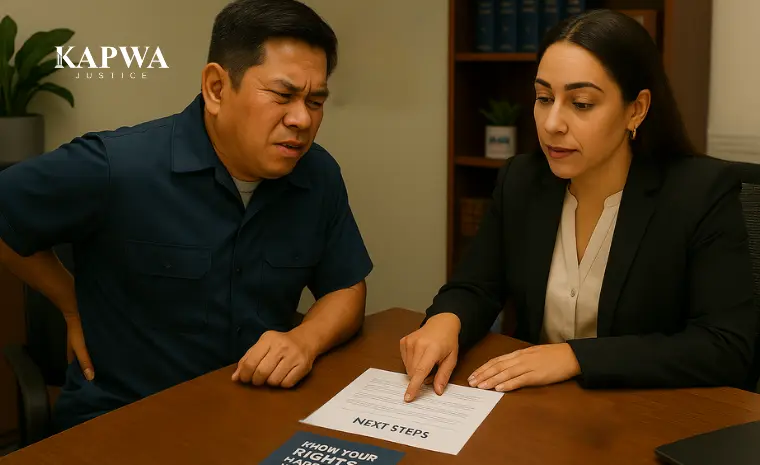Imagine clocking in for another day at work, only for everything to change instantly—a slip, a fall, a sudden pain in your back. You’re not just hurt; you’re uncertain. What happens next? Who helps you now?
If you’ve been injured at work, understanding how the California workers’ comp system protects you is the first step in reclaiming control over your future. For Filipino-American workers in California, the path to recovery begins with knowing your rights—and how to assert them. This guide will walk you through every step.

The Overlooked Impact of Workplace Injuries in California
Workplace injuries are more common than most think—and more serious.
In California, wage and salary workers accounted for a significant 81% of workplace fatalities. Among these unfortunate events, transportation-related incidents were the most common, making up 25% of all fatalities. Many of these cases involve immigrant labor, including Filipino immigrants working long hours in physically demanding roles.
While these numbers are alarming, what’s even more troubling is that many Filipino-American workers don’t report their injuries, often due to fear of retaliation, losing their jobs, or having their immigration status questioned. The good news? California law protects all workers, regardless of status.
Understanding California Workers’ Comp: Your Legal Safety Net
If you’ve suffered a work-related injury, you may be eligible for compensation benefits under the California workers’ comp system. This program ensures medical treatment, temporary or permanent disability benefits, and even job retraining in some cases.
Key Protections You Have Under California Law:
- You cannot be fired or retaliated against for filing a compensation claim.
- Immigration status does not affect your eligibility for compensation benefits.
- You are entitled to financial compensation even if you were partially at fault.
- Part-time, seasonal, and some independent contractors may still qualify.
- You can switch doctors within your employer’s network, or choose your own after 30 days if no network applies.
Depending on the severity of your injury, you may also qualify for vocational rehabilitation, or, in tragic cases, death benefits for surviving family members. These benefits are designed to ease the burden of lost income and rising medical bills.
Actions to Take If You’re Injured at Work
If you’re an injured worker, here’s what you need to do to protect your rights and maximize your claim:
- Report the injury immediately
- Notify your supervisor and complete a report of injury. Don’t wait—delays can hurt your claim.
- Seek medical treatment
- Visit a medical provider approved by your employer. Always request a copy of your medical records.
- Document everything
- Record how the workplace injury occurred, any witnesses, and all treatment received.
- File a workers’ comp claim form (DWC-1)
- Your employer must give this to you within one working day of your injury report. A Tagalog version of this form is also available.
- Follow up with the insurance carrier
- Ensure your employer’s insurance carrier is processing the claim.
- Consult a personal injury attorney
- A professional can help you understand your options, especially if you’re dealing with spinal cord injuries, traumatic brain injuries, or delays in your compensation claims.
Common Fears and Why You Shouldn’t Ignore a Job Injury
Fear #1: “I might get deported.”
Truth: Filing for California workers’ comp does not require immigration status disclosure.
Fear #2: “I’ll lose my job.”
Truth: It’s illegal for your employer to retaliate against you. If they do, they can face penalties.
Fear #3: “I can’t afford a lawyer.”
Truth: Most personal injury law firms—especially California personal injury lawyers—work on contingency. That means no fees unless you win.
Know the Terms: Workers’ Comp vs. Personal Injury
| Workers’ Comp | Personal Injury Claims |
| No need to prove fault | Must prove someone else was at fault |
| Covers medical bills and lost wages | May include property damage, pain, and suffering |
| Handled through the state system | Filed in civil court |
| No punitive damages | Possible to seek punitive damages |
In some complex cases, you may be eligible for a workers’ comp claim and a separate personal injury claim. Consulting with a personal injury lawyer can help clarify your legal avenues.
Don’t Miss the Deadline
California’s statute of limitations for filing a workers’ comp claim is one year from the date of your workplace accident. Missing this deadline can mean losing your right to maximum compensation. Huwag sayangin ang pagkakataon.
Talk to Someone Who Understands
Experienced tradesmen, new hires, and essential workers should know their rights under California workers’ comp to avoid struggling alone and receive the help they deserve. Many Filipino-American workers in California juggle multiple jobs to support their families. This isn’t merely a legal issue; it’s about safety, dignity, and survival.
If you’ve been injured at work, you don’t have to navigate the system alone. Our California personal injury lawyers offer free consultations and are here to help Filipino immigrants, Asian Americans, and all accident victims pursue the justice and financial compensation they deserve.
📞 Contact our team today to get started.




